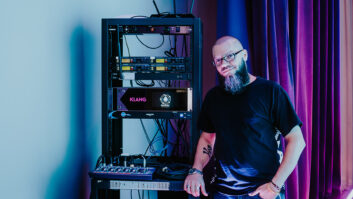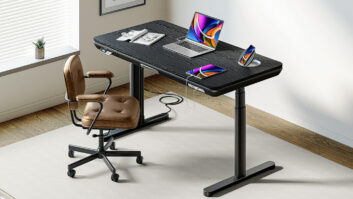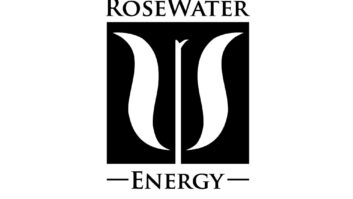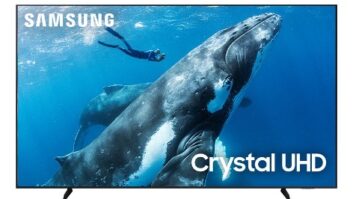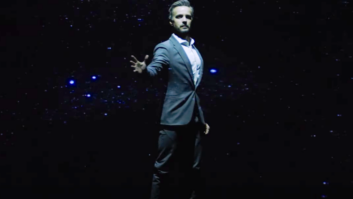A new copy protection format skirmish has erupted around the recent launches of HDTV-level D-VHS recording decks from JVC and Mitsubishi.
At issue are the relentless attempts of some consumer electronics manufacturers to get Hollywood to agree to release some pre-recorded HDTV programming that could be used to support the growing field of HDTV-grade digital television sets and monitors.
JVC, the developer and licensor of both the VHS and D-VHS recording systems, has introduced a copy protection solution called “D-Theater” in its new HM-DH30000 D-VHS recorder ($1,999 suggested retail). D-Theater was developed to protect high-quality prerecorded media from mass duplication, in part, to encourage reluctant Hollywood film producers to release HDTV movies on D-VHS tape and provide legions of new DTV set-and monitor owners with the ability to watch prerecorded HDTV programming.
But the addition of the new system has raised the ire of Mitsubishi, which is marketing an HDTV D-VHS deck that does not employ the new encryption approach.
Recently, four Hollywood studios (Artisan, DreamWorks, Fox, and Universal) announced plans to release HDTV movies using the D-Theater D-VHS format later this year. Other content producers, including HDNet founder Mark Cuban, are working on the distribution of HDTV D-VHS programming that do not include D-Theater encryption.
All D-Theater D-VHS movies will play back on JVC’s HM-DH30000 recorder but only those that omit D-Theater encoding will be compatible with the Mitsubishi’s HSHD2000U ($995 street retail).
Asked before CES why Mitsubishi elected to omit the D-Theater system, Mitsubishi marketing VP Bob Perry said: “It is our belief that D-Theater is still a proprietary encryption system, that it creates confusion in the marketplace and it creates a situation where a consumer can buy a tape and not be sure whether it will play or not.”
Mitsubishi’s deck was designed to ship HD-level signals over IEEE-1394 jacks to one of the company’s new IEEE-1394 enabled, fully integrated HDTV sets. The deck will not send those signals over analog HD component video jacks, because the copy protection system selected by Mitsubishi — Digital Transport Copy Protection (DTCP) a.k.a. “5C” — is designed to work only with the IEEE-1394 digital interface.
D-Theater was designed to go beyond digital gate keeping encryption systems such as DTCP and HDCP (for DVI connections) to protect HD-level content on packaged media. JVC said the multiple encryption systems would work together with D-Theater, and that IEEE-1394 connections on the HM-DH30000 deck employ DTCP.
D-Theater encryption carries instructions on how content may be used, such as which outputs will be permitted to carry the signal to the television monitor. That way, if the D-Theater encoding allowed for component video outputs (as found on the JVC deck), the decrypted signal is transmitted through those terminals. Signals permitted to be sent over IEEE-1394/5C or DVI/HDCP could further protect the interfaces.
Currently, the JVC deck is designed to only ship HDTV signals over HD component connections. Unlike the Mitsubishi deck, JVC’s model also offers an MPEG2 decoder, so it can send the decoded D-VHS signal directly to most HDTV monitors without first going to a set-top box or internal decoder in a television set.
Mitsubishi’s deck does not include an internal decoder. It stores undecoded bitstream signals on the D-VHS tape, and sends that signal over the IEEE-1394 interface to an external decoder equipped with IEEE-1394 and DTCP, such as a Mitsubishi HDTV set or forthcoming IEEE-1394/DTCP DTV decoder boxes.
Virtually any HDTV monitor will accept signals from the JVC deck, but presently only Mitsubishi television sets will accept and play back signals from the Mitsubishi deck.
JVC representatives said Mitsubishi, which licenses D-VHS technology from JVC, was offered the opportunity to include the D-Theater encryption system in its D-VHS deck, but opted not to.
Mitsubishi’s Perry said it was unclear that D-Theater would garner support from anyone.
“At the time we became aware of D-Theater it seemed to be a proprietary encryption system that would only be adopted by JVC and would not be made part of the D-VHS standard,” Perry said. “Since it was explained to us as a non-standard encryption system, it did not seem that it would add any consumer value, because our D-VHS deck already had 5C (DTCP), which is a very robust system of copy protection.
“We believe it is not a consumer value to duplicate a $500 or $600 retail priced circuit in every digital device,” Perry explained. “That’s why we support IEEE-1394, alone. At the same time, the 5C system [DTCP] and the way we are using it does not allow for unprotected component video output. We believe it is actually more secure than the JVC system which allows for unprotected analog output.”
A recent JVC statement on completion of the D-VHS/D-Theater platform clarified the contractual status: “The platform incorporates a new proprietary encryption system [D-Theater] to prevent the unauthorized duplication of high value [HDTV] content. The system has been added as an option to the D-VHS standard for products in the North American market.”




